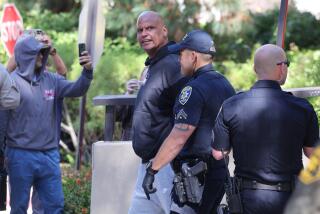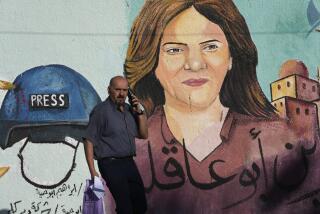Democracy Requires Media Freedom
- Share via
JERUSALEM — For seven days in May, I was held without questioning or being charged by the Palestinian police in the West Bank city of Ramallah. Although no one said so directly, there is no doubt that my detention was connected to my involvement with the live broadcast of the Palestinian Legislative Council. The live coverage by Al Quds Educational Television is part of our university’s attempt to use television to introduce democratic awareness. I never expected to be thrown in jail for relaying an unedited and live version of what the people’s elected representatives were saying.
My detention by the Palestinian police was not easy for me or my family. It sent a terrible message about the rule of law and respect for democratic values at a time when the entire world was backing the Palestinian political position regarding Israel’s settlement activities.
But as troubling these days were for me, they were a source of inspiration as I saw literally thousands of Palestinians and other supporters from all over the world helping to secure my release. While the international attention that my case received through the media and the high-level American and European (governmental and nongovernmental) intervention certainly played a large role in my eventual release, it is the local Palestinian mobilization that has been the greatest source of pride for me. Almost 30 fellow Palestinian journalists stuck their necks out to sign a petition to President Arafat calling for my release and for respect of the rights of a Palestinian free press. Members of the legislative council voiced support for me and called for an investigation of the circumstances of my illegal arrest. Four cabinet ministers in the Palestinian Authority spoke directly to President Arafat about my case in the weekly cabinet meeting. Local human rights groups and a variety of Palestinian intellectuals signed statements in my support.
All of these groups and individuals deserve special praise, for they are the guarantee for the eventual victory of democracy over tyranny. But a lot of work is needed if we Palestinians are to make serious inroads in securing the rule of law and the separation and independence of the three branches of government (executive, legislative and judicial). Strengthening the Fourth Estate--a free media--is certainly the best insurance policy for the sustainability of any democracy.
To grow, democracy needs political and economic stability. At present the Palestinian situation is in turmoil. The stalemate in the peace process caused by the Israelis’ unilateral decisions to build illegal settlements in Palestinian territories has put a major dent in the Palestinians’ nation-building effort. As long as the Palestinian situation is not stabilized, it will be impossible to effectively fight for democracy while the national priority is that of safeguarding what little territory is left from Israeli expansion and settlement-building.
When those in authority act in a dictatorial manner, it is easy to simplify the problem or look for easy scapegoats. Those who think that full-fledged Western-style democracy doesn’t exist for Palestinians because Yasser Arafat is the leader are wrong. Certainly a different leader could have dealt with my case and other related cases differently. But the absence of a mature democratic rule can’t and should not be based solely on who is the highest executive of the land. Democracy must exist in the Palestinian home, in the school, in the club, in the community and in the press. The leading Palestinian newspaper Al Quds, for example, did not report my arrest or my release even though it is an independent, privately owned newspaper.
In the area of reaching the goal of free media, it is necessary to work on three fronts simultaneously. The basic need is to train a cadre of professional journalists whose mastery of the craft is such that they will be indispensable. Such training need not focus only on the technical side of reporting and broadcasting but must also include media ethics and values. We also need to work on drafting and approving press laws that protect journalists and the media. Journalists must be able to protect their sources and must have immunity from arrests and pressure from the political establishment. Most important of all is the need to create a free media tradition. This will make the arrest of a journalist much more difficult; it also will take the longest to accomplish. A tradition requires not only time but also sacrifices. Until then, we must find the courage to continue in the search for a free press in a free Palestine.
More to Read
Sign up for Essential California
The most important California stories and recommendations in your inbox every morning.
You may occasionally receive promotional content from the Los Angeles Times.










